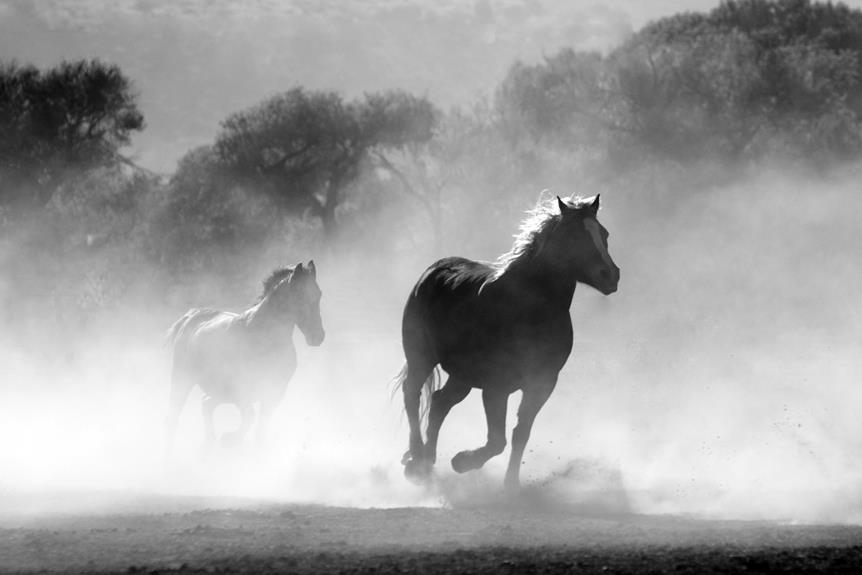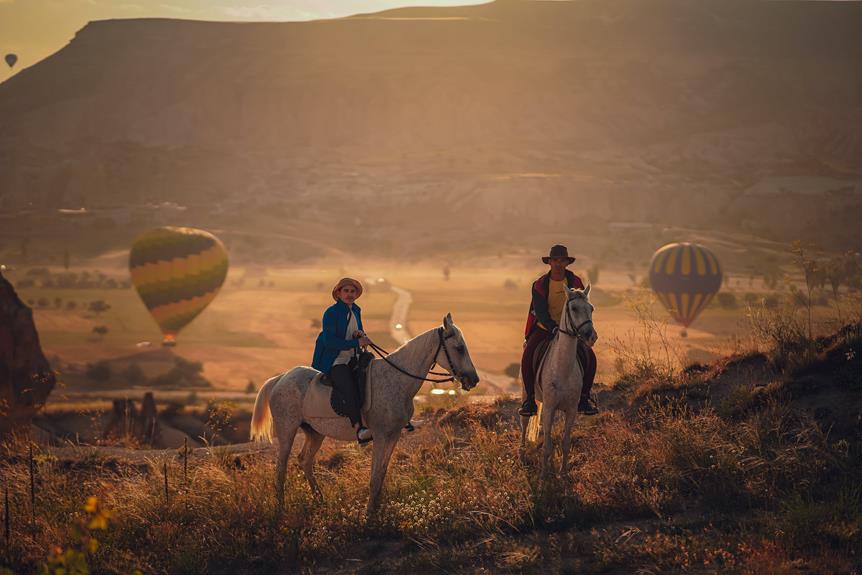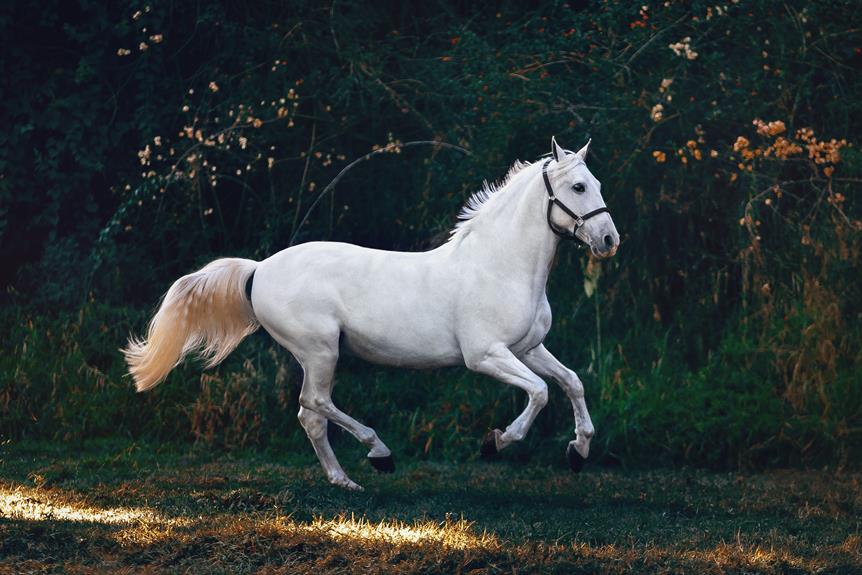They say that in the wild, it's survival of the fittest. And when it comes to wild horses, this adage holds true.
Have you ever wondered why these majestic creatures sometimes find themselves kicked out of their herds? Well, my friend, there are several reasons that drive this behavior. From the establishment of dominance hierarchies to fierce competition for reproduction, wild horses face a multitude of challenges that can result in their expulsion from the herd.
But that's just the tip of the iceberg. There are other intriguing factors at play, including age-based hierarchy, health concerns, environmental factors, and resource scarcity.
So, if you're curious to uncover the fascinating reasons behind why wild horses get kicked out of herds, then get ready to embark on a journey that will shed light on the intricacies of their untamed world.
Key Takeaways
- Aggression and dominance play a crucial role in establishing and maintaining positions within wild horse herds.
- Horses that refuse to accept the hierarchy or challenge the dominant horse may be banished from the herd.
- Competition for resources, breeding opportunities, and maintaining balance within the herd can lead to expulsion.
- Health concerns, including severe injuries, contagious illnesses, and unhealthy body language, can result in horses being perceived as threats and expelled from the herd.
Dominance Hierarchy and Scattering
When it comes to dominance hierarchy and scattering among wild horses, aggression is the key factor in establishing and maintaining their positions within the herd. Wild horses live in social structures known as herds, where a dominant horse establishes a pecking order.
The dominant horse exerts its authority through aggressive behavior, using its body language to communicate its status. Aggressive body language includes pinned ears, bared teeth, and threatening postures. Lower-ranking horses may challenge the dominant horse in an attempt to rise in the hierarchy, but this can lead to further aggression.
Horses that refuse to accept the established dominance hierarchy may be seen as a danger to the social order of the herd. To maintain social stability, horses that go against the herd hierarchy may be banished, or 'kicked out' of the herd. This scattering of horses serves as a way to ensure that only horses willing to accept the established dominance structure remain within the herd.
Reproduction Competition and Expulsion
Reproduction competition and potential expulsion are significant factors in the dynamics of wild horse herds. In these herds, dominant stallions usually have priority in breeding with most of the mares. This leaves less dominant males struggling to find mates and creates competition for reproduction. Challenging for higher positions in the hierarchy can cause conflict and increase the chances of being kicked out of the herd.
In addition to competition for mates, wild horse herds also compete for limited resources such as food and water. Scarcity of resources can lead to horses being kicked out if they can't find enough to survive. When resources are scarce, the dominant horses may push the less dominant ones out, forcing them to move away from the herd in search of better conditions.
Horse behavior plays a significant role in the potential expulsion of individuals from a herd. Older and experienced horses usually have more seniority and hold a higher rank. However, younger horses may assert dominance over older ones, potentially leading to the expulsion of less dominant horses.
Furthermore, sickness or injury can also result in horses losing their place in the herd. Infected or injured horses may be seen as an additional burden on the group, making them vulnerable to expulsion.
Understanding the factors that contribute to the expulsion of horses from a herd provides valuable insights into the social dynamics of wild horse populations. By studying these behaviors, researchers can gain a deeper understanding of the truly wild horse and the intricate dynamics within a herd of horses.
Age-Based Hierarchy and Exclusion
Older and experienced horses hold a higher rank in wild horse herds, establishing an age-based hierarchy that determines social status and resource access.
In wild horse herds, dominant horses often assert their authority over others through various means, including physical interactions and body language.
Younger horses may challenge older horses for dominance, leading to potential exclusion from the herd. This exclusion isn't necessarily based on age alone but also on the ability to maintain a higher rank within the social structure.
Immature horses or foals may be kicked out simply because they aren't yet useful to the group's hierarchy. Additionally, as the herd grows larger, some horses must be kicked out to maintain balance and resource availability based on age-based hierarchy.
It's important to note that horses have a keen sense of vision and are able to communicate through subtle body language cues. This allows them to establish and maintain social order within the herd.
The stallion, as the dominant male, plays a crucial role in maintaining herd dynamics and enforcing the age-based hierarchy.
Health Concerns and Expulsion
If a wild horse develops significant health concerns, it may be expelled from the herd. The well-being and survival of the herd are of utmost importance, and any horse that poses a risk to its health and stability may face expulsion.
Here are some reasons why a horse may be kicked out of the herd due to health concerns:
- Injury or illness: If a horse suffers from a severe injury or contagious illness, the dominant stallion or other herd members may perceive it as a threat to the overall well-being of the herd. In order to protect the rest of the group, the horse may be forced to leave.
- Lack of food: In times of scarcity, a horse with health issues may struggle to find enough nourishment to sustain itself. The dominant members of the herd may push it away to ensure that the stronger and healthier individuals have access to the limited food resources.
- Unhealthy body language: Horses communicate through body language, and if a horse's health concerns are evident in its posture, movement, or behavior, it may be seen as a weakness by the dominant members of the herd. This can lead to its expulsion.
- Disrupting herd dynamics: A horse with significant health concerns may disrupt the social structure and dynamics of the herd. This can create tension and conflict among the other horses, leading to the expulsion of the horse in question.
- Risk of spreading disease: If a wild horse carries a contagious disease, it may be expelled from the herd to prevent the spread of the illness to other members. This action serves as a protective measure to maintain the overall health and survival of the herd.
Environmental Factors and Herd Exclusion
When it comes to wild horses getting kicked out of herds, environmental factors play a crucial role in their exclusion. Wild horse herds exist in a dynamic and ever-changing environment, and their survival depends on their ability to adapt and compete for limited resources. Horses need ample space to move and graze, and when the herd becomes too large for the available resources, some horses must be expelled to maintain balance.
One important factor in herd exclusion is the body language of the horses. Dominant horses establish their position through aggression, and lower-ranking horses are often banished if they can't compete for resources. Competition for mates can also lead to conflict among male horses, and engaging in risky behavior, such as attempting to mate with mares outside the herd, can increase the chances of being kicked out.
Scarcity of resources is another environmental factor that can result in herd exclusion. When food and water become limited, horses that can't find enough to survive may be forced to leave the herd in search of better resources. Additionally, sickness or injury can lead to expulsion, as infected or injured horses are seen as an additional burden on the group.
Frequently Asked Questions
Why Do Horses Kick Other Horses Out of the Herd?
Horses kick others out of the herd due to social hierarchy, resource competition, reproductive conflicts, dominance, aggression, genetic diversity, behavioral differences, and environmental factors. It's all about survival strategies, leadership, and decision-making.
Why Do Ranchers Hate Wild Horses?
Ranchers hate wild horses for various reasons. They believe they have negative economic impacts, cause overgrazing, compete for resources, damage fences and property, transmit diseases, require population control, pose public safety concerns, and conflict with the livestock industry, causing environmental impacts.
What Happens to Wild Horses That Are Rounded Up?
When wild horses are rounded up, they undergo an adoption process. This is done for population control, as well as to prevent habitat destruction. However, there are controversies surrounding roundups and their impact on the ecosystem and the welfare of captured horses. Reintroduction programs and alternatives to roundups are being explored to mitigate long-term effects on herd dynamics.
Are Wild Horse Herds Inbred?
Wild horse herds may experience inbreeding risks due to limited genetic diversity. Population control, natural selection, and social dynamics play a role in dispersal patterns and breeding strategies. Herd management and conservation efforts aim to address ecological impacts and maintain healthy populations.
Conclusion
In conclusion, wild horses may get kicked out of herds for various reasons, including the establishment of dominance hierarchies, competition for reproduction, age-based hierarchy, health concerns, and environmental factors.
Dominant horses assert their position through aggression, leaving lower-ranking horses at risk of banishment. Additionally, competition for mates can leave less dominant males struggling to find partners.
These factors contribute to the scattering and expulsion of horses from their herds, highlighting the complex dynamics within wild horse populations.



0 Comments